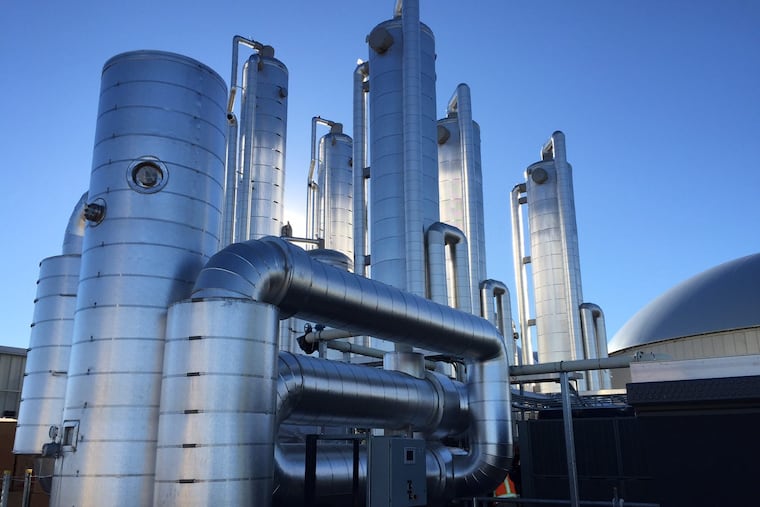Pa. stymies Philadelphia green-energy plan to add biogas to PGW’s fuel
PGW proposed to replace a small amount of fossil fuel with renewable natural gas. The state balked because biogas costs five times more than shale gas.

A Philadelphia Gas Works green energy pilot project that would have replaced a small amount of the fossil fuel it sends out to homes with renewable natural gas was rejected by state regulators on Thursday because the program couldn’t justify the higher cost of the biogas.
The Pennsylvania Public Utility Commission, on a 3-1 vote, approved a plan for PGW to procure natural gas supplies for the next two years that excludes the proposed biogas pilot project. Under PGW’s proposal, the city-owned utility would have spent as much as $500,000 a year to buy renewable natural gas (RNG) made from landfill or farm waste. The RNG would have amounted to less than 1% of the fuel that PGW sends out to customers.
Climate activists have pressed the city government and PGW to reduce the utility’s carbon emissions. PGW told the PUC that the pilot project was a way to gain experience in the RNG market to prepare for a time when biogas becomes a larger part of the market as utilities look for alternatives to fossil fuel to meet climate mandates.
But the PUC’s staff and Pennsylvania’s Office of Small Business Advocate objected to PGW’s plan, saying it would violate state law that requires state-regulated utilities to procure least-cost energy. RNG is about five times more expensive than natural gas. The PUC’s Bureau of Investigations and Enforcement said the “outrageously expensive” gas directly conflicts with the obligation to lower gas costs.
Pennsylvania’s Office of Consumer Advocate and PUC Administrative Law Judge Darleen Heep had recommended that the PUC adopt PGW’s plan.
State utility law “does not permit the commission to approve the acquisition of more expensive natural gas where it has not been shown to be necessary to ensure safe, adequate, and reliable service,” Commissioners John F. Coleman Jr. and Ralph V. Yanora said in a statement.
The commissioners said that they are not opposed to the use of RNG, but that biogas use “must nevertheless comply” with the law. They said the PUC last month permitted UGI Utilities to adopt rules allowing biogas to be distributed on its gas system to specific customers who agree to buy it, but the rules protect customers at large from paying additional costs.
Coleman and Yanora were joined by Gladys Brown Dutrieuille, the commission chair. Dutrieuille said she supported the PGW pilot project, but joined with the two other commissioners so that PGW’s overall gas procurement plan would get approved.
David W. Sweet, the PUC’s vice chairman, dissented, saying PGW program’s costs were an “infinitesimal amount” — about 0.4% of the nearly $123 million the utility spends a year on energy purchases. “I find this amount to be reasonable in determining the impacts of new gas procurement strategies,” he said.
PGW said Thursday the PUC “clearly expressed” appreciation for the company’s desire to include RNG into its energy mix.
“While we are disappointed that they did not approve our pilot program, we are encouraged by their interest in working collaboratively with the General Assembly and other stakeholders in support of future sustainable pathways,” said Richard G. Barnes, a PGW spokesman. “PGW is committed to exploring creative strategies to address climate change.”
The issue highlights the push-and-pull in the ongoing policy debate in Pennsylvania over how to address climate change.
Environmentalists say Pennsylvania utilities need to accelerate a switch to renewable energy to reduce carbon emissions. For instance, climate activists have pressed Peco Energy for years to buy more solar energy than it is required to under state law. But utilities and regulators say that without authorization from lawmakers, their hands are tied.
The Republican-controlled General Assembly has demonstrated little appetite for climate mandates, such as the Regional Greenhouse Gas Initiative, which might result in higher consumer costs.